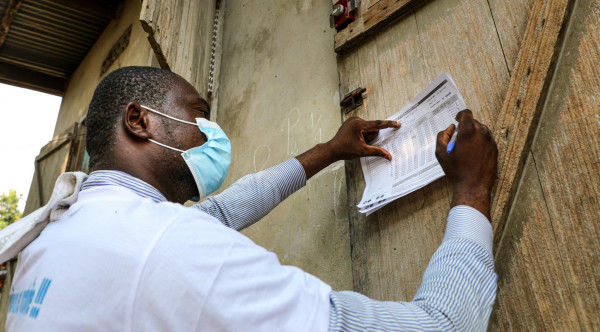 As countries ramp up vaccination efforts to protect children against the polio virus, the World Health Organisation Regional Office for Africa (WHO AFRO) has said that the region faces an urgent threat of type 2 variant poliovirus (cVDPV2) with over 290 poliovirus detections.
As countries ramp up vaccination efforts to protect children against the polio virus, the World Health Organisation Regional Office for Africa (WHO AFRO) has said that the region faces an urgent threat of type 2 variant poliovirus (cVDPV2) with over 290 poliovirus detections.
Together with the United States Centres for Disease Control and Prevention (US CDC) and the Gates Foundation, WHO AFRO is focusing on equipping and training laboratories across Africa with an innovative advanced Sanger sequencing technology, a crucial method in investigating new regions in the poliovirus genome.
WHO in a press statement said it plans to expand the training on Advanced Sanger Sequencing training to key countries across the continent and the regional expansion would ensure that multiple countries are better prepared to contribute to Africa’s polio eradication journey.
Celebrated on October 24, the yearly World Polio Day (WPD), provides a chance for public and civil society partners to raise awareness and resources for the global effort to eradicate polio.
It also seeks to diversify the diagnostic windows for polioviruses to reduce time spent before poliovirus detection, equip lab personnel with the skills to operate advanced sequencing technologies and provide timely results for public health decision-makers.
Sequencing allows laboratories to pinpoint genetic changes in poliovirus strains, provide critical data for tracking transmission pathways and understand viral evolution. The technology offers a level of precision that helps identify mutations in real time and makes it possible to detect emerging threats swiftly.
The coordinator, Regional Polio Laboratory Network at the WHO Regional Office, Africa, Dr Jude Kfutwa, noted that advanced sequencing will not only open different diagnostic windows for efficient and rapid diagnosis but will also provide much-needed evidence for the success of specific vaccination campaigns essential for ongoing polio eradication efforts.
“The data gathered through this technology informs decision-making, ensuring that the right public health interventions are deployed in time to prevent further spread of the virus,” she said.
To ensure that countries have the necessary capacity to detect polioviruses accurately and without delays that could hinder response efforts, South Africa under the umbrella of the Global Polio Eradication Initiative (GPEI), hosted the first round of the training, where laboratory personnel received hands-on experience in Advanced Sanger Sequencing techniques.
Rotary International is using the day as an opportunity to showcase the status of the eradication effort, and what steps need to be taken to ultimately achieve a lasting world free of all polioviruses.
Speaking on the issue, President, Rotary Club, Isolo, Allison Tokumbo, said that Nigeria is at zero level although countries like Afghanistan, Pakistan and Gaza have reported outbreaks, prompting the world to keep polio at zero all over the world.
Tokumbo explained that hesitation and ignorance are still a huge hindrance to the vaccine uptake by people and therefore more awareness is needed for Nigeria to continue to remain a polio-free country. “That’s why we do polio walk yearly, so that people can understand that the vaccine that we want to give is not for death, and it’s not a trap, neither is it to cause harm, but to prevent polio disease,” she said.
Meanwhile, the outbreak of variant poliovirus type 2 in Gaza has drawn the world’s attention to the reality that as long as polio exists, all countries will remain at risk.
The Global Polio Eradication Initiative (GPEI) emphasised that this year’s WPD is an opportunity not just to celebrate progress but to re-garner support and commitment at all levels.
MEANWHILE, Rotary International has reiterated its commitment to polio eradication on or before 2029. The club said it has been working towards that goal since 1979, and plans to create a polio-free world.
To mark this year’s WPD, Rotary International District 9111 and District 9112 held a joint- press conference, where the Past District Governor, Niji Raji, said the organization is partnering with other bodies such as the World Health Organisation (WHO), United Nations Children Emergency Fund (UNICEF) and the Global Polio body Initiative to eliminate polio.
Raji said: “We had about 350 cases of polio in 125 countries, but today, only two countries are endemic, Pakistan and Afghanistan with only 50 cases. Over 35,000 Rotary Clubs across six continents teamed up to fight polio from the grassroots.’’
District Governor, Rotary District 9111, Dr Oluwole Kukoyi, stated that polio eradication is one of the significant achievements of Rotary. He explained that although Nigeria and Africa have been declared polio-free, the essence of the yearly event is to discuss the current polio situation around the world, as well as continue polio awareness.
IN related development, the Lagos Island Polio Eradication Awareness Walk was led by past Assistant Governor /Chairman District Polio Plus Committee, Adenike Abdul-Azeez. She said that the motive was to raise awareness and administer the polio vaccine to children.
Rotary District Governor District 9111, Femi Adenekan, said Rotary has committed over $2.5 billion to eradicate polio only from Nigeria and worldwide.
Chairman Polio Committee District 9111, Jide Ogunjimi, said the event emphasises the need to continuously immunise children between ages zero and five to stop the spread of polio.






